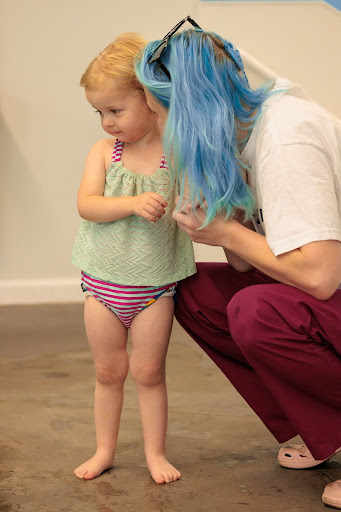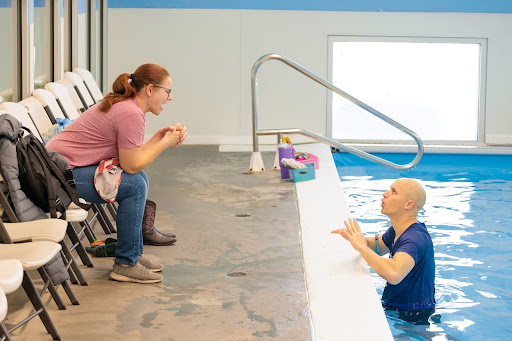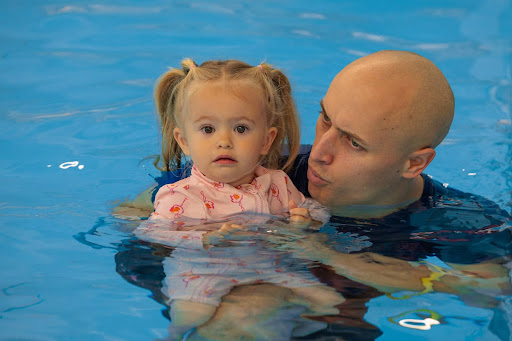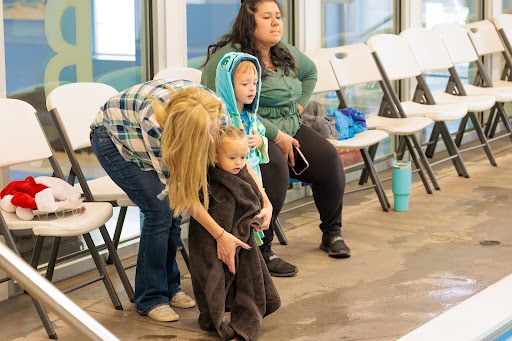Guidelines to Follow to Help Your Child Experience Success
1. Handling Tears and Fears
When it comes to crying and fear, the most important factor is how you, the parent, react. Validating our kids’ emotions while still asking them to do tough things is super important for their growth. When we acknowledge their feelings, we show them that their emotions matter, building trust and emotional security. At the same time, encouraging them to face challenges, even when it’s hard, helps them develop resilience and problem-solving skills. By striking this balance, we help our kids tackle life’s obstacles with confidence, knowing they have our support. This way, we not only nurture their emotional well-being but also prepare them for the real world.
In survival swimming lessons, you can best support your child by acknowledging their efforts and reinforcing the positive things they are doing. To do this, clap and give verbal praise during and after the lesson. Make your comments as specific as possible, like saying, “Great arms!” You can also acknowledge their feelings by saying, “That was hard for you, but you did it anyway!”

2. Keeping Instructors Informed
Communicate your child’s feelings to the instructor as specifically as possible. This way we can help the child deal with their concern. (i.e. your child says they hear their head filling up with water when laying on their back.)

3. Discussing Daily Progress
Talk to your child about their lessons. What was easy today in swimming lessons? What was hard? Remind them as they move hard things to the “easy” category they have mastered a new skill!
4. Learning by Watching Peers
Let them watch some other lessons. Point out to them that it seemed easier for the other children when they listened and did it the way the teacher suggested.

5. Using Others' Success to Motivate
When you see another child doing something your child can do, say “You can do that can’t you!” If you see them doing something they are learning, say “That’s still on your hard-to-do list, but soon it won’t be so hard.” If it’s something they haven’t begun to learn, say “You will work on that skill someday when you are ready and it will become easy too.”
Examples: Face in to get the rings, kicking, floating, and rolling back to breathe.
6. Celebrating Progress Together
Talk with them about other successes they have had and how they had to work to develop the skill. Video them swimming and watch the videos together after lessons. Show them videos of them practicing other skills that were difficult at first and are now easy for them. (i.e. learning to walk, using a fork, riding a bike, etc.)

7. Showing Off Achievements
Let them show off their stamp to parents, siblings, neighbors, etc. Tell the person “__ got their smilie for being a happy swimmer and a star for being a hard worker at swimming today. They especially did well at… (catching the wall, floating, kicking, etc.)”
8. Creating Fun Swimming Tunes
Make up songs to sing together on the way to and from the pool “__ swims with big kicks big kicks big kicks” (Change it to fit the situation.)
9. Using Imagination to Reduce Fear
Let them pretend to be the infant swimming teacher with toy people in the tub or with stuffed animals on the couch. This lets them feel in control, and you may learn by listening to them play where their biggest concerns lie.

10. Teaching Bravery and Confidence
ALL fears are learned. The only way to overcome fear is to confront and conquer it. If you are afraid and your toddler sees that fear, it will be harder for them to ever feel comfortable in the water, and at their survival swimming lessons.
11. Guiding Your Child's Swimming Journey
Once your child has learned to swim, please continue to reinforce positive swimming behaviors. Avoid allowing them to swim in a floatation device. It causes poor head orientation, weak arms and does not allow them to build up their lung capacity, which are very important factors in infant swimming.
You play a big part in making this a positive experience. Remember, even if your toddler is not yet verbal, they understand a lot of what you say and how you say it. These lessons are individualized to meet the needs of each student, so please let us know of any concerns you may have, and let’s work together to help your child experience success!
